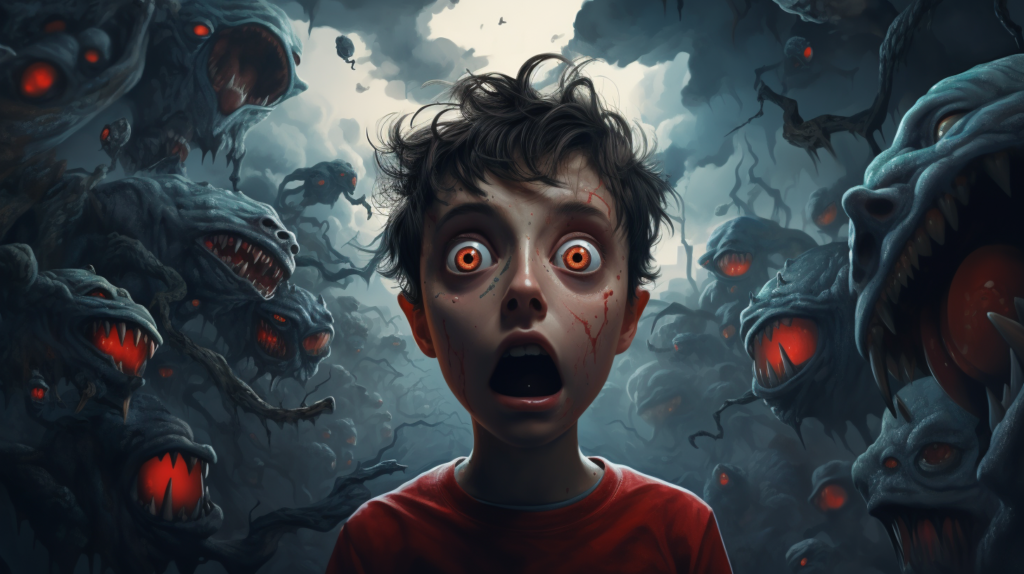Humanism
More Than an Escape: The Hidden Power of the Narrative Storm
16 February 2026

Fear is not a pleasant sensation. A tightness in the stomach, dryness in the mouth, and accelerated breathing. The mind conjures up the worst possible scenarios. It's a burden on both our psyche and body. Nevertheless, so many people simply enjoy being scared. Why is that?
Fear is one of the most primal emotions experienced by humans. Like anger, disgust, sadness, surprise, and joy, it is felt by everyone regardless of culture or upbringing. Like these emotions, fear was crucial for our ancestors in terms of survival and building relationships.
It can be said that many of the things we fear today have been genetically passed down to us. What often intensifies our fear includes darkness, strange sounds, certain animals – especially spiders and snakes – and death, along with its inherent associations: transience, illness, and suffering. For our ancestors, fear of these phenomena was vital for survival, as it mobilized their bodies to be vigilant and then to flee or fight in the face of danger.
Though ophidiophobia (fear of snakes) and arachnophobia only affect a portion of us, few people consider such animals as pleasant companions. The prospect of walking down an unlit street, even if it is right next to our home in a quiet neighborhood, can cause an accelerated heartbeat and quicker step. Death and the suffering associated with it, often avoided in our conversations, can provoke significant fear for the future. A certain fear accompanying Western countries is tied to job insecurity, debt, and high living costs. While the fear of an animal or darkness disappears when there is no contact with the fear-inducing reality, the uncertainty of tomorrow can poison our thoughts for a long time, maintaining a state of generalized anxiety.
Fear is an extremely unpleasant and energy-consuming emotion. This is due to the hormones released under its influence.
We recommend: On Closeness: The Clash of Desire with Fear
Under the influence of fear, our body begins to produce hormones: cortisol, adrenaline, and dopamine.
Cortisol, known as the stress hormone, affects the body’s metabolic processes, influences immunity, and regulates sugar metabolism. It mobilizes the body for greater effort in the face of danger, while also increasing endurance. However, if its level remains high in the body for too long, it can lead to mood declines, reduced immunity, excessive appetite and cravings, and consequently, an increase in body weight.

Adrenaline, the survival hormone, mobilizes the body to either fight or flee in dangerous situations. It dulls the sensation of pain, speeds up heart rate, improves breathing capacity, dilates pupils, supports glucose production, and enhances blood flow to muscles. As a result, the body is fully prepared for action. The effects of adrenaline release can last up to an hour. However, its overproduction can lead to heart damage, insomnia, and anxiety.
Dopamine – the happiness hormone. Its role in the body is not fully understood, but it is known to influence the brain’s reward system. It acts as a signal confirming that something pleasurable has occurred.
Cortisol and adrenaline help to safely navigate fear-inducing situations. They were indispensable for our ancestors who fought for survival. Dopamine, on the other hand, makes overcoming fear satisfying, allowing people to recount scary situations with lightness and even joy. Paradoxically, the memory of fear can bring satisfaction.
This feeling is thus linked to the question of why we like being scared and why we venture into fear-inducing spaces.
The first horror film as a genre emerged in 1896. The Haunted Castle was a short film, lasting only three minutes, depicting a bat flying into a room and transforming into Mephistopheles. The character then conjures a girl, phantoms, and skeletons from a cauldron. The terrifying vision disappears when the protagonist brandishes a cross. The creator not only used pioneering special effects but also tapped into primal human fears: darkness, death, and monsters lurking to prey on humans.
We recommend: Understanding and Overcoming Shame: A Glimpse into the Psychology of Emotion
Since then, hundreds of films have been released in cinemas, scaring viewers by tapping into the same fears our ancestors had. The alien hunting astronauts is often a blend of a slippery snake and a spider. The protagonists are chased by the undead, mummies, skeletons, or the devil himself, threatening eternal death. The audience watches in suspense, wondering what will emerge from the dark forest through which the characters navigate with flashlights.
Although we have been watching films for over 100 years, culture has utilized horror for thousands. Consider gothic novels, the mythology of ancient peoples filled with monsters and death, theatrical performances, and even the legends told by elders around the fire, listened to in terror by village inhabitants. They were scared, but they listened.
Thus, we endure the rushes of cortisol and adrenaline, but also dopamine. All this happens in a safe environment, with the comforting thought: ‘It’s just a story. Just a book. Just a film. Just a video game.’
Consciously exposing ourselves to fear serves our psyche in a similar way that a gym, sauna, or cold-water immersion serves our body. During physical training, plunging into icy water, or conversely, basking in hot steam, the body is pushed to its limits. Extreme fatigue, overheating, or drastic body temperature drops are hardly pleasant states, yet after finishing a workout or stepping out of a sauna, we feel great, forget the initial shock, and plan to do it again. These strenuous events positively influence our immunity, health, and overall functioning, significantly because they occur in controlled and safe conditions.
Watching horror films, playing scary games, or listening to frightening stories follows a similar principle. Although encountering a stimulus that induces fear triggers hormone production preparing us for fight or flight, we are aware that we are not in actual danger. The vampire on the screen remains a fictional creation, and the alien attacking us in a dark spaceship corridor, navigated down via keyboard, will not jump out of our wardrobe. The real experience of joy and satisfaction provided by dopamine remains, making us want to expose ourselves to fear again.
Furthermore, facing terrifying situations in artificially created conditions trains our psyche and body to confront real dangers when we encounter them in life. Just as a person who regularly exercises will more easily handle a surge of activities at work or home, someone accustomed to horror films can more quickly manage their fear in everyday life.
It is also worth noting that fear is a motivator for innovation. A person who fears something will find new ways to defend against that threat. Such fear undoubtedly motivated humans to ‘invent’ fire, devise methods of farming, or search for cures for diseases.
Despite all the unpleasant consequences it brings, fear is very beneficial for us. It is no wonder that so many of us simply enjoy being scared.
Translation: Klaudia Tarasiewicz